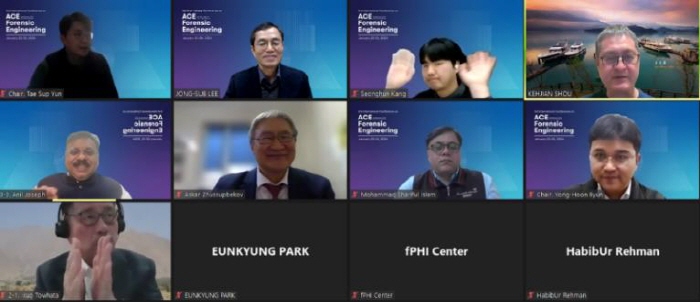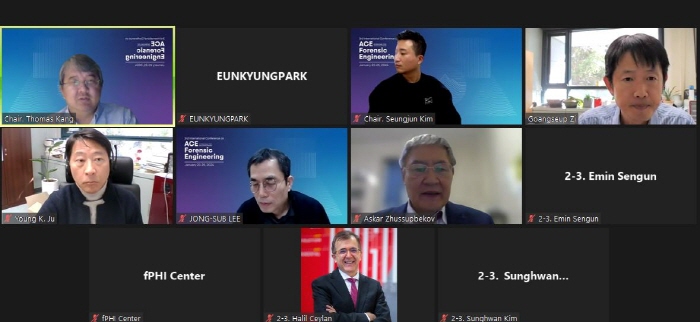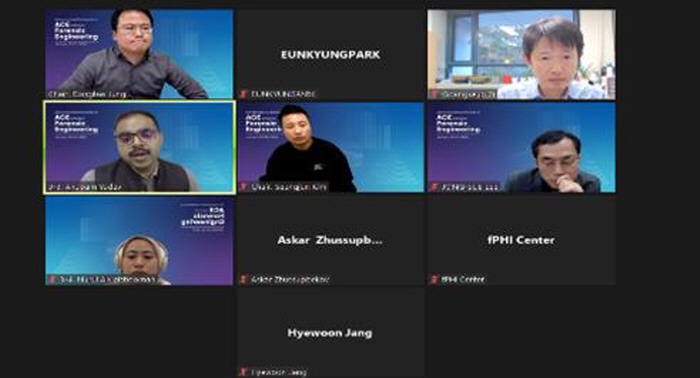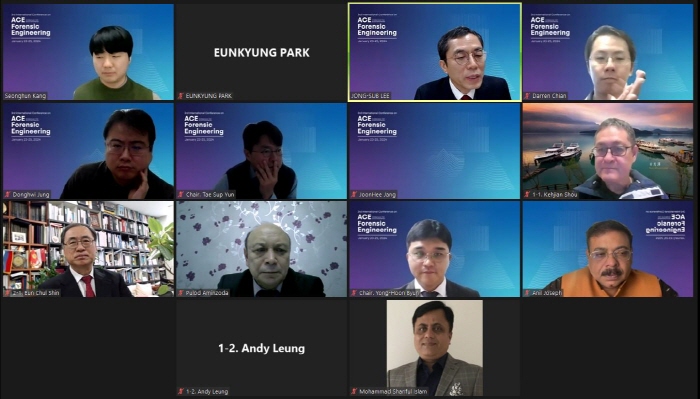Korea University: The 3rd International Conference on ACE Forensic Engineering Hosted by Hyper-converged Forensic Research Center for Infrastructure
The Hyper-converged Forensic Research Center for Infrastructure held the 3rd International Conference on ACE Forensic Engineering (3rd ICACEFE) from January 23 (Tue) to 25 (Thu) with the theme “Innovations and Challenge of Geotechnical Engineering for Forensics and AI Research Topics for Structural Engineering-based Forensic Engineering and Water Environment Forensic Engineering.”
This event was the third international conference held since the establishment of the Center in June 2021 after the conferences held in January 2022 and January 2023. More than 700 people from 57 countries participated in this conference, which was held online as a Zoom webinar, to listen to lectures given by 29 speakers from a total of 19 countries.
On the first day (January 23), three sessions were held under the theme “Innovations in Geotechnical Engineering.”
The first day began with an opening speech by Professor Lee Jong-sub of the School of Civil, Environmental and Architectural Engineering, who serves as the director of the Center, and a congratulatory speech by Kim Young-wook, the President of the Korean Geotechnical Society.
The first session, chaired by Professor Lee Jong-sub, was conducted on the topic of “Geotechnical Modeling and Monitoring”. Following a speech by Professor Keh-Jian Shou, Vice President of the International Society for Soil Mechanics and Geotechnical Engineering, who is internationally recognized for groundwater prediction, two sessions were held with the themes of “Forensic Failure Assessment” and “Piling and Foundations”. In the sessions, active academic exchanges and information sharing took place among the participants with six speakers who presented lectures on topics such as the underground structures of future energy sources and the prevention of ground disasters caused by extreme freezing and thawing due to climate change.

On the second day, the 24th, sessions were held with the theme, “Challenges in Geotechnical Engineering” in relation to geotechnical engineering. The sessions began with a welcoming speech by Professor Byun Yong-hoon of Kyungpook National University, a co-researcher, and the lecture continued in a passionate atmosphere.
In the “Advanced Characterization Techniques, Safety and Serviceability Sessions I amp; II”, ten speakers gave lectures on topics that included ground evaluation using shear waves and foundation damage and the monitoring of foundations during high-rise building demolition.
Topics related to geotechnical engineering were discussed on both the first and second days. Presidents of geotechnical engineering societies and professors from different countries joined as speakers and received significant attention. A variety of studies was presented, including the latest theories, deep learning, sensing, and accident cases related to forensics in the field of geotechnical engineering. Lectures were also delivered on technologies to improve preparedness for disasters caused by each country’s geological location and climate as well as engineering ethics.
At this academic conference, which was conducted with over 400 people connected in real time, the attendees actively participated in discussions during each session, asking questions and providing insightful comments on the presentations.

On the 25th, the last day, “Forensic Structural Engineering Sessions I & II” were held in the field of structural engineering under the theme of “Structural Engineering-Based Forensic Engineering.” The first session was chaired by Professor Kim Seung-jun of the Department of Civil, Environmental and Architectural Engineering, and the second session was chaired by Professor Kang Hyeon-gu of Seoul National University, with six speakers delivering a lecture.
With more than 300 attendees, various academic and information exchanges took place while listening to talks on structural design technology using artificial neural networks, the application of artificial intelligence technology, and aged concrete structural members.
In the afternoon, four speakers gave lectures in the areas of water and environmental engineering. Professor Jung Dong-hwi of the Department of Civil, Environmental and Architectural Engineering chaired a session devoted to the topic “Advanced Structural Engineering·AI, ML and Optimization Technique for Water and Environmental Forensic Engineering,” and a lecture was given with the theme of “System and Model Robustness for Hydrosystems in the Era of the Fourth Industrial Revolution” to discuss robust methodologies for applying actual high-dimensional optimization problems to water resource systems.
All of the speakers provided insight into strategies for collecting high-quality data and conducting research using machine learning (ML), an optimization method in water and environmental engineering. Following the presentations, there was a lively question-and-answer session between the audience and the speakers, leading to rich academic exchanges and information sharing. About 445 people registered and participated in the conference on the last day, actively giving comments and participating in discussions, meaning that the conference served as a meaningful platform to discuss the future of forensic engineering in the water and environmental fields.

The 3rd ICACEFE was successfully concluded thanks to the enthusiastic participation of the attendees, and Director of the Center Professor Lee Jong-seop said, “I would like to express my great gratitude to the passionate lectures of the speakers and the active participation of the audience members from various countries. We also ask your continued interest in and support for the ERC Hyper-converged Forensic Research Center for Infrastructure. We look forward to the success of the 4th ICACEFE, scheduled for 2025.”
With the goals of effectively identifying the causes of infrastructure accidents during complex disasters and preventing disasters, the Hyper-converged Forensic Research Center for Infrastructure at KU was founded in November 2021 to break away from independent efforts to develop technologies in different infrastructure sectors and establish a hyper-converged platform encompassing the superstructure and substructures as well as the water environment infrastructure. The Center has been taking the lead in various research activities, paper presentations, and educational activities.

